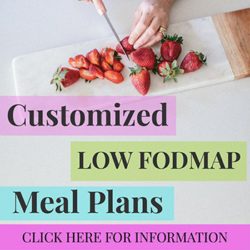As previously discussed Irritable bowel syndrome, more commonly referred to as IBS, is an uncomfortable and sometimes debilitating disorder of the large intestine (colon). It causes symptoms such as bloating gas, abdominal pain, cramping, diarrhea, and constipation. Fortunately, IBS doesn’t cause permanent damage to the structural organs and it doesn’t cause inflammation or changes in the tissue like as in more serious GI conditions such as ulcerative colitis or Crohn disease. Symptoms of IBS can and often are controlled with lifestyle and diet modifications.
As with any condition, your body may react differently to changes in lifestyle or diet, so it will be imperative to find a qualified and understanding dietitian/nutritionist to help manage the IBS symptoms. They will help you better understand the reasons of your symptoms and possibly use the low FODMAP diet to manage them. 
This low FODMAP diet has been working really well for me, but it is quite a complicated diet, especially at the beginning, so it will take the care and attention given by a dietitian to provide you with a detailed list of high FODMAP food that will need to be eliminated in the first phase of this diet.
FODMAP is an acronym that stands for a collection of complex names, which are molecules found in the foods, which are often not absorbed properly by people with IBS. High FODMAP foods in IBS patients are not broken down properly in the small intestine, and they then travel untouched to the large intestine, where they feed the natural bacteria that live there. This is what causes the symptoms.
The restriction list on a low FODMAP diet is intimidating and can be a daunting task for anyone, especially for vegetarians and those who can’t afford organic foods with few ingredients listed on the nutrition panels. For example, fructose and wheat need to be avoided, as well as various fruits, beans, dairy, and legumes because of their high FODMAP ingredients. Trying to determine hidden FODMAP levels in ingredients, whether or not gluten and casein-free diets are helpful, or understanding what fermentable fibres are present just a few of the challenges that face IBS sufferers.
(I am creating low FODMAP recipes at the moment, and I aim at providing a selection of vegetarians and vegan recipes too. Please subscribe to this blog and I will let you know when the recipes are available).
Probiotics and fibre supplements can help the symptoms, but it is important to consult an expert for the right type, as often these supplements have a high FODMAP makeup, and need to be avoided by IBS sufferers.
There are a few steps you can take to ease symptoms, however, if you can’t get into a nutritionist right away, such as (but not limited to):
- Research high FODMAP foods and aim for fresh foods with very few ingredients on the label.
- Keep a high-fiber diet with leafy green vegetables that are on a generalised low FODMAP food list until you can talk with a professional nutritionist and get a more customised FODMAP food list that will eliminate the troublesome symptoms of IBS.
- Limit stress levels, as they exacerbate symptoms.
Get a low FODMAP Diet Shopping List Guide to help you improving IBS symptoms on this website. High FODMAP foods aren’t easily broken down by the intestines and can cause gas, bloating, constipation, diarrhoea or a combination of the two, amongst other symptoms.



Thanks for simplifying Low-FODMAP diet a bit.
So glad you were able to get some use of my blog. Thanks John.
Hi Larah,
Just wanted to say what a great article on the low FODMAP diet. There isn’t a great deal of information out there that i can find and this site will help me and my IBS
Donna
Glad you find this article useful Donna, I am working on compiling a proper low FODMAPs food list to give away to subscribers. It should be ready soon.
I am just putting in a sample diet plan for an IBS sufferer. Hope it will be of some help for you 🙂
Breakfast
Gluten-free or spelt toast with vegemite, strawberry jam (sweetened with sucrose)
Cereal (oats, porridge, cornflakes*, rice bubbles*)
Tea or coffee (lactose-free milk if you have lactose malabsorption)
Serve of suitable low FODMAP fruit
* add oat or rice bran for extra dietary fibre
Lunch
Gluten-free or spelt sandwich with fillings (ham/salad, tuna/ salad, cheese/salad, egg/ lettuce)
Soup homemade with low FODMAP vegetables
Fresh salads with dressing (olive oil, lemon juice) and plain meat
Gluten-free pizza with low FODMAP vegetable toppings
Dinner
Meat/fish/tofu plus low FODMAP vegetables/ salad plus potato/rice/gluten-free pasta/rice noodles
Snacks
One serve of suitable fruit (cantaloupe, banana, grapes, strawberries, orange)
Yoghurt (lactose-free if you have lactose malabsorption)
Gluten-free biscuits and cakes
Thank you for the meal plan Dr Jayan, very much appreciated. I have learnt to eat mainly simple, not processed food which is also low in FODMAPs From time to time I have a ‘cheat’ food and I am prepared to pay for the consequence, that will remind me not to do it again (until the following time)
IBS (irritable bowel syndrome)is characterised by chronic and relapsing symptoms; lower abdominal pain and discomfort, bloating, wind, distension and altered bowel habit (ranging from diarrhoea to constipation) but with no abnormal pathology.
FODMAPs (stands for Fermentable Oligo-saccharides, Disaccharides, Mono-saccharides and Polyols).
FODMAPs can be poorly absorbed in the small intestine. Mal-absorbed carbohydrates are fermented by gut bacteria to produce gas. Current research strongly suggests that this group of carbohydrates contributes to IBS/FGID symptoms. FODMAPs are found in a wide range of foods.
Generally trying to stop usage of the bads foods if you can is advisable but if you really need certain items try and keep the usage down to a minimum. Onion and garlic are particularly bad triggers and should be avoided as best as you can. Try and avoid processed foods and meats. Always look at ingredient lists and try and look for the main culprits: onion, garlic and wheat products.
Where can I get a comprehensive list of all of the high FODMAP foods that I should be avoiding? Do you think and IBS Friendly label could ever be possible like Shivettes says?
Hi Francis, the Monash University has a pretty good list. I have purchased their iPhone app and it is great, because when I am not sure about a type of food (especially at the restaurant) I’ll check it on the app.
I wish there was a simple “IBS Friendly” label that came on all foods. But the reality is, we’re all stewards of our own health. It’s challenging, requires study, and persistence. But it’s definitely worth it!
Yes, I wish that too, it would be great to see a low FODMAP range of food, even though I am sure it will never be as good as home made food from scratch.
I’d say the best foods for IBS patients, is organic products. A lot of the commercial foods in our stores nowadays are riddled with ingredients that make production cheaper, yet less healthy for a consumer. IBS not only debilitates you physically, and mentally but also financially. It’s not a very great syndrome to have. It’s a inconsistent syndrome for people, and yes, it should be consulted with a specialist before going on any crazy diets at all because, like you said, our body could react very differently.
This explains the IBS condition very well. The body contains many systems that rely on hormones and chemicals. When one is system is compromised, its can effect the entire body’s physiology. The digestive system is no exception. At least digestive issues can be relieved by simple changes in diet!
Thanks for stopping by Heidi. Thankfully for me, the change of diet worked. I would love to hear from others though and see if their symptoms have improved after starting a low FODMAP diet.